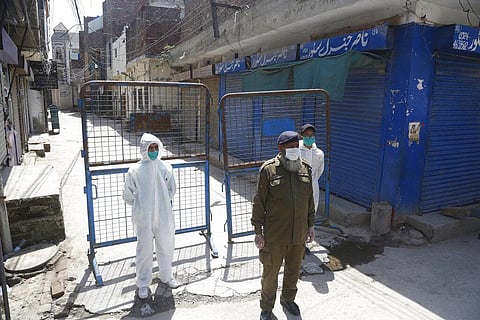

ISLAMABAD: Pakistan Prime Minister Imran Khan warned on Saturday that the coronavirus cases could increase by the middle of the next month posing a challenge to his government, as the country reported 622 fresh cases taking the total number of COVID-19 patients to 7,638.
"The government enforced a lockdown in March when there were only a few cases. We also started screening people at airports and pilgrims returning through land borders," Khan said while addressing the media in Islamabad.
He warned that numbers could increase by the middle of the next month, posing a challenge to his government.
"Our initial projections said that we would have 50,000 cases by April 25. Thankfully that's not the case. Our new projections suggest that we will have 12,000 to 15,000 coronavirus patients. The pressure we expected earlier can now be felt next month," Khan said.
He also asked the people to continue following the official guidelines, otherwise it would be difficult to control the situation.
Khan said that there was no shortage of essential medical equipment and the government was procuring ventilators and personal protective equipment to prepare for the situation.
He also rejected reports that the government was hiding the figure of fatalities and said some people were spreading "fake news" that more people died than reported.
He said that there was no shortage of any food item and warned hoarders and smugglers of strict action.
"The government will also announce an ordinance to crack down on smuggling soon," he said.
Meanwhile, the government succumbed to pressure from the hardline clerics and allowed conditional congregational prayers in mosques during the month of Ramzan, endangering the drive to curb the spread of coronavirus.
President Dr Arif Alvi, who met with religious leaders and political representatives of all provinces, said a 20-point plan has been agreed upon.
"It is an important agreement and it has been reached after consensus among all religious leaders," he said.
The clerics have agreed to follow the government guidelines on social distancing while praying in mosques.
The Pakistan Ulema Council (PUC) said it will follow the government's 20-point agenda for congregational prayers including taraweeh in Ramzan.
Alvi said if the government felt at any point that the guidelines were being violated or the disease was spreading, then it can re-consider its decision regarding the opening of mosques.
The Pakistan government had banned congregational prayers in mosques but the decision was only partly followed.
Minister for Religious Affairs Pir Noorul Haq Qadri also appealed to clerics to take the coronavirus threat seriously, warning them that they would be held accountable if the number of patients and death toll multiplied.
"If the situation goes out of hand, people will target religious scholars in their criticism," he said.
Several countries including the UAE, Saudi Arabia, Iran, Algeria, Tunisia, Jordan, Kuwait, Turkey, Syria, Lebanon and Egypt have stopped congregational prayers in mosques due to the virus outbreak.
Dr Faisal Sultan, the Prime Minister's focal person on the coronavirus crisis, said the government will probe 300 deaths in Karachi this week.
"Some 15 of the 300 deaths are suspected to be because of coronavirus. We are looking into it but cannot yet comment further on it," he said.
Planning Minister Asad Umar said that Pakistan was not out of danger despite lower number of patients.
"We need to increase our testing capacity at once. Our aim is to conduct 25,000 tests daily by the month's end," he said.
PM's Advisor on Security Moeed Yusuf said that the government was committed to bring back all stranded Pakistanis in a phased manner.
"We are trying to increase our quarantine and testing facilities so that we can bring them back as soon as possible. Our target is to bring back up to 7,500 people every week," he said.
Earlier this week, Foreign Minister Shah Mahmood Qureshi said about 40,000 Pakistani wanted to come back but were stuck up in various countries.
Minister for Industries Hammad Azhar said that the government would bring a scheme for the payment of utility bills on installments to benefit the small businesses and shop owners.
He also said that more food items would be available at government-run utility stores during Ramzan and would be sold on controlled rates.
Meanwhile, the Ministry of National Health Services reported that 143 people have died so far including 8 in the last 24 hours.
Another 1,832 had recovered, while 622 new patients were identified during the last 24 hours.
The worst-hit province of Punjab registered 3,410 patients, followed by Sindh with 2,355, Khyber-Pakhtunkhwa 1,077, Balochistan 335, Gilgit-Baltistan 250, Islamabad 163 and Pakistan-occupied Kashmir with 48 patients.
The ministry showed that so far 92,548 tests had been conducted, including 6,416 in the last 24 hours.
The steady rise continued despite hectic efforts to contain the spread.
One of the biggest hurdle faced by the authorities has been to convince clerics to stop congregational prayers in mosques of the country.
Meanwhile, it was reported that two women who returned to Pakistan from India via the Wagah border tested positive for the novel coronavirus.
They were among 41 people who returned to the country on Thursday, according to The Express Tribune newspaper.